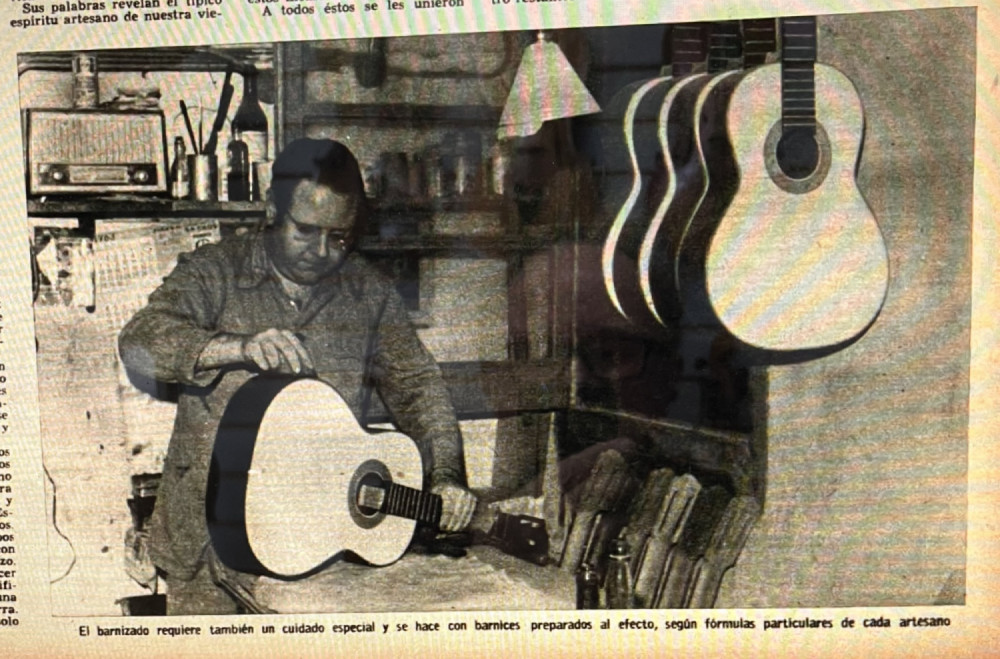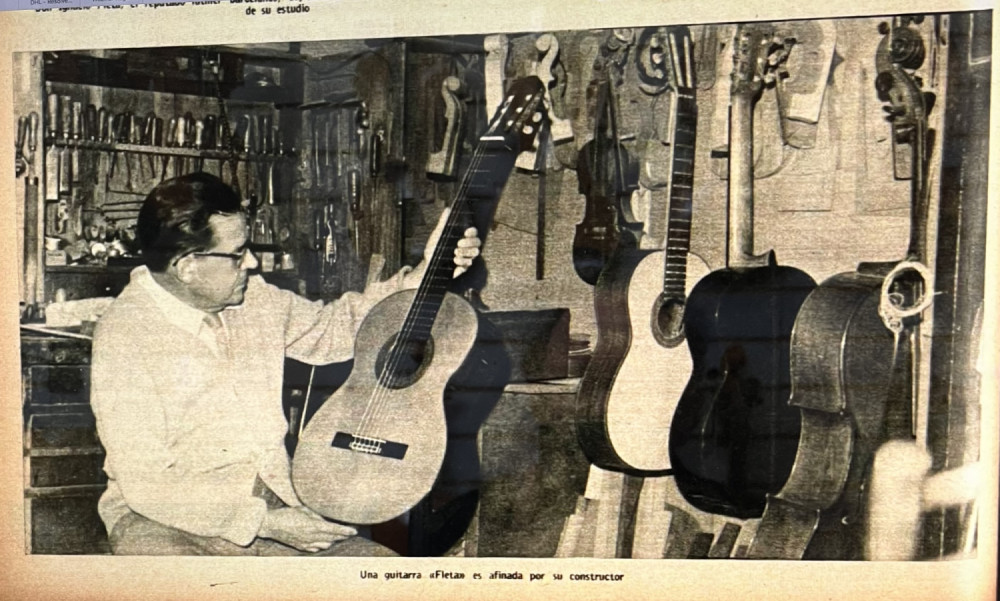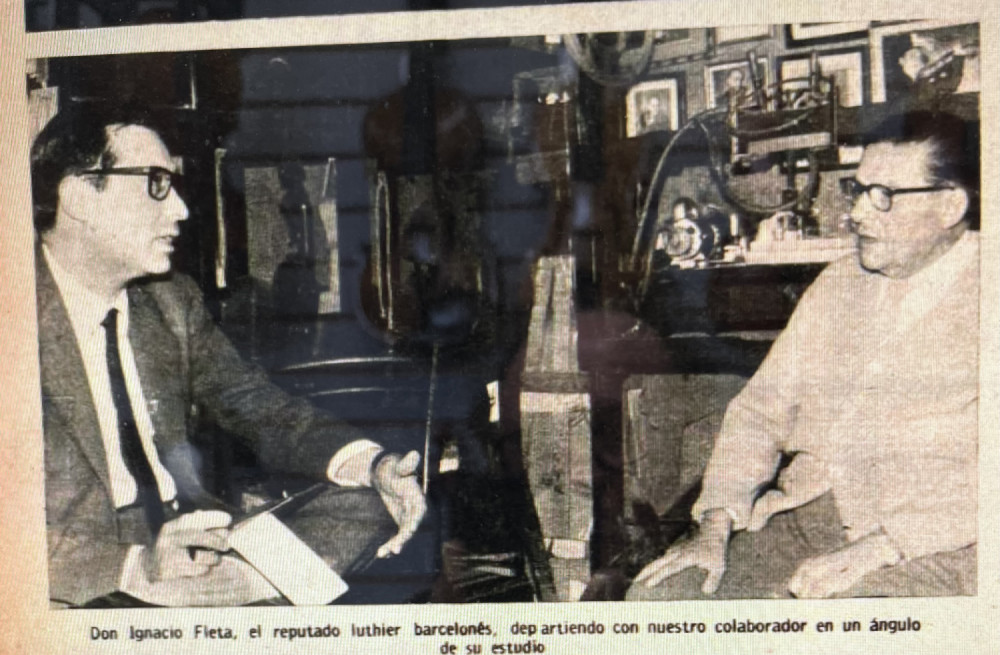1964 Interview: IGNACIO FLETA, A “LUTHIER” FROM BARCELONA
IGNACIO FLETA, A “LUTHIER” FROM BARCELONA
"Andres Segovia. Like Narciso Yepes, John William and many international soloists, he uses guitars built by Ignacio Fleta, the refined Barcelona luthier, refined, craftsman with a worldwide reputation.
Ignacio Fleta has also experienced the overflowing suggestion of the guitar and, only with his orders firmly accepted, has a delivery period of three years. His production —only quality guitars, no flamenco or other varieties— is destined almost entirely for soloists of fame And he has had to reject innumerable demands that, due to the quantity, did not fit with his condition as a pure craftsman.
Formerly as a good "luthler", he fabricated violins and cellos, but in the last five or six years the use of the guitar in concerts has increased so much that the demands are increasingly cornering the classic bowed instruments in his craftsmanship. Notwithstanding him, he told me. In the construction of guitars he uses the same technique of pure "luthierie". He used only the highest quality imported woods, and 'I give them a special treatment.'
Spruce for the soundboard, jacaranda or “rosewood” for the backs and sides, ebony for the fingerboard and cedar for the neck are the main raw materials. The frets are separated with nickel silver alloy bars and the inlaid adoraos around the soundhole are fine works of art. All the wood is dried for a long time in the air and in the sun in the first phase of preparation. It then goes through a dehumidification regimen and receives a hot air treatment. And then it is subjected to the successive action of infrared and ultraviolet to complete the necessary adaptation process.
Manual construction, in genuine craftsmanship, requires exquisite care —I would almost say the same. In this way, the production cannot be large. Still working all day helped by his two sons, who are expert "luthiers" like him. Ignacio Fleta can only release two guitars in a month. Five in two months, tops. But, this yes. each of them is a real gem. And all of them, identical, give the same sonority.
—Not long ago a famous concert player was here trying to choose his guitar among three that we had finished; his choice took an entire afternoon of trials and hesitations. Actually, the differences are imperceptible even to the most educated ear.
While he was telling me this, I noticed a spark of legitimate pride in Ignacio Fleta's eyes. In spite of everything, current concert guitars have also evolved, depending on the circumstances. Mr. Fleta himself admits it.
"Of course, these now are not like the old ones." It must be taken into account that currently the soloist has to face the consequences of the acoustic peculiarities of each listening room. And there are very large ones, full of public, in which his guitar must be clearly heard, whether he acts as a soloist or in a large orchestra. We have had to work hard to achieve a warm, balanced and powerful sound that can be perceived in the most spacious concert halls without losing any quality. Today I can assure you that our current guitars sound even better in a large room than in this small room where we are.
It is evident that much progress has been made in the field of sonority. But in the old days guitars would last longer; This is what they told me, at least. Mr. Fleta will know why.
—Before, guitars hardly moved from the place of residence of their owners. That way the ones from now would last as long. But today concert players constantly travel from one part of the world to another, often by plane, and the guitar suffers sudden changes in temperature, which are its worst enemy. Another important destructive element is central heating.
We see. Subjected to the incessant movement of modern times, guitars do not last as long as in the calm antiquity. Will his current predicament at least last?
The symptoms indicate a still growing boom. Certainly, the study of the guitar is more rewarding than that of most other classical instruments, since some audible results can be obtained in a relatively short time, and on the other hand it is such a sensitive instrument... Through the tip of the fingers, the performer can transmit his expressive emotion and the full range of reactions of his mood or sentiment. And since it seems that the most general trend is directed towards the stimulation of expressiveness, with preference to the exercise of technique, it is to be presumed that a long period of splendor still awaits the guitar.
I am convinced of this to such an extent that I consider the teaching of guitar crafts in arts and crafts schools to be of positive national interest. It is necessary to consolidate the world prestige of the Spanish guitar through the propagation of its autochthonous manufacture, which is otherwise a typical and genuinely Spanish activity. Seen also from a purely practical and speculative point of view, it appears to us as a fabulous business that it would be foolish to despise. In what other type of Spanish manufacturing is there a global demand so scandalously higher than supply?"


